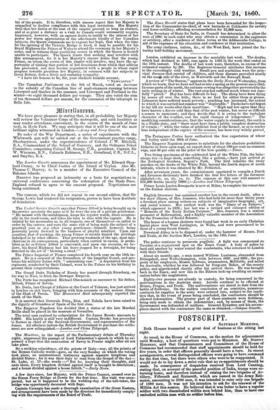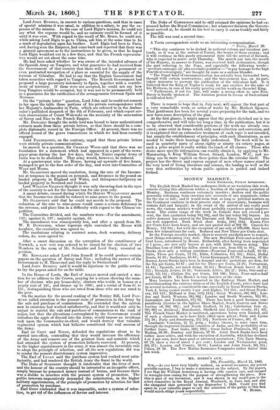POSTSCRIPT.
SATURDAY MORNING.
As usual, in the House of Commons, on the motion for adjournment until Monday, a host of questions were put to Ministers. Mr. SIDNEY HERBERT, said that Commissioners and Committees of the House of Commons had recommended that staff appointments should be held for five years, in order that officers generally should have a turn. In recent arrangements, several distinguished officers were going to have command for the first time, but there were others who were to be reappointed. It would not do to lay down a strict rule that no re-appointments should be made. In consequence of despatches received from Lord Canning, stating that, on account of the peaceful position of India, troops were re- turning home, and therefore instead of raising the two brigades of Ar- tillery, Fifteenth and Sixteenth, which are named in the Army Esti- mates, amounting to 2206 men, it was intended to raise only one brigade of 1000 men. It was not his intention to ask for the renewal of the Militia Act this session. He believed that it was better to have a regular soldier with two disembodied militia men behind him, than to have one embodied militia man with no soldier before him. Lord Jonsi RUSSELL, in answer to various questions, said that in eases of special missions it was usual, in addition to a salary, to pay the ex- penses of the mission. In the case of Lord Elgin's mission, he could not say what the expense would be, and no estimate could be formed of it until it was over. With regard to the recall of Mr. Bruce, he could not, while asking Lord Elgin to go to China, ask him at the same time to fix a mark of degradation upen his brother. Lord Elgin had been to Paris, and, having seen the Emperor, had come back and reported that there was a general agreement as to the instructions to be given, so that he hoped Lord Elgin wouldset out in a few days, and that the French representa- tive would set out about the same time.
He had been asked whether he was aware of the intended advance of the Spanish Army on Tangiers, and what guarantee he had received from the Government of that country that there will not be a permanent or even protracted oocupation of a place so essential for the supply of the fortress of Gibraltar. He had to say that the English Government had taken securities with regard to Tangiers. The Moorish Government had proposed a large pecuniary indemnity to Spain, together with a resettle- ment of territory. If these were not accepted, he could not say how long Tangiers would be occupied, but it was not to be permanently held as a guarantee for the ratification of the arrangements between Spain and Morocco.
On the "private letter" question, Lord John said he could not consent to lay upon the table those portions of his private correspondence with her Majesty's Ambassador in Paris, which are referred to in the Ambas- sador's published despatch of the 5th of February, and which report cer- tain observations of Count Walewski on the necessity of the annexation of Savoy and Nice to the French Empire.
Mr. DISRAELI thought the noble lord was bound to have authenticated extracts made from these private letters, so that there should be a com- plete diplomatic record in the Foreign Office. At present, there was no official record of the grave transactions in which we had been recently engaged. Lord PALMERSTON, on the contrary, urged that these private letters were strictly private communications. In answer to a question, Sir CHARLES WOOD said that there was no foundation for a statement which had appeared in a part of the news- paper press during the last few days, that the Native regular Army of India was to be abolished. That army would, however, be reduced.
At-a quarter-past nine the House, having sat upwards of five hours, managed to get to the first order of the day, and went into Committee of Ways and Means. Mr. GrAnsrosia moved the resolution, fixing the rate of the Income- tax at tenpence in the pound on personal, and fivepence in the pound on landed property in England and Wales, and threepence-halfpenny on landed property in Scotland and Ireland.
Lord WILLIAM GRAHAM thought it was only throwing dust in the eyes of the country to ask for the Income-tax for one year only. A smart debate, ensued during which Sir HENRY WILLOUGHBY moved that the Income-tax should be reduced to nine pence in the pound.
Mr. GLADSTONE said that he could not accede to the proposal. The reduction of the rate to nine-pence would cause a serious deficiency in the revenue, and place him in a difficulty with regard to the Chinese ex- pedition.
The Committee divided, and the numbers were—For the amendment, 132; against it, 187; majority against, 55.
The amendment was consequently lost, and after a speech from Mr. W. E DUNCOMBE, whose vigorous style convulsed the House with laughter, the resolution was agreed to.
The resolutions relating to contract notes, dock warrants, delivery orders, &c. were agreed to.
After a smart discussion on the corruption of the constituency of Norwich, a new writ was ordered to be issued for the election of two Members in the room of Mr. Schneider and Lord Bury, unseated on petition.
Mr. RINGLAXE asked Lord John Russell if he could produce certain papers on the question of Savoy and Nice ; including the answer of the Government to M. Thouvenel and the reply to Switzerland ?
Lord Jon sr RUSSELL said it would be injurious to the public service to lay the papers asked for on the table.
In the House of Lords, the Earl of AIRLIE moved and carried a mo- tion for an address to the Crown, praying for a return showing the num- ber of electors who pay house-duty, electors who reside in houses at a yearly rent of 10L, and thence up to 100/., and a rental of from 6l. to 151., distinguishing those who are rated from those who are not rated to the poor.
On the motion for the second reading of the Mutiny Bill, Lord PAM- Mules called attention to the present state of promotion in the Army by the sale and purchase of commissions. He contended that the system now in existence had worked satisfactorily, and that it would not only be unjust to restrict the sale and purchase of commissions to the rank of major, but that the alterations contemplated by the Government would introduce the apple of discord into the Army, would impose an invidious task upon the Commander-in-chief, and would destroy that valuable regimental system which had hitherto constituted the real success of the Army.
Earl DE GRZY and Brew; defended the regulations about to be carried into effect, contending that they would increase the efficiency Of the Army and remove one of the greatest blots and scandals which had attended the system of promotion hitherto exercised. At present, in the higher appointments in the army, it was almost the invariable rule to adopt the principle of selection, and all the new regulations did was to render the present discretionary system imperative.
• The Earl of Lucerr said the purchase system had worked most satis- factorily, and had rendered the British Army the finest in the world. The Duke of SomEitssr thought it intolerable that the lives of men and the honour of the country should be intrusted to an incapable officer, simply because he possessed money instead of brains, and because there was a dislike to interfere with the present system of promotion. The public interests imperatively demanded the substitution, in the higher inilitary appointments, of the principle of promotion by selection for that of promotion by purchase.
Earl GREY contended that it was impossible, under a system of selec- tion, to get rid of the influences of favour and interest. The Duke of CAMBRIDGE said he still retained the opinions he had ex- pressed before the Royal Commission ; but whatever decision the Govern- ment arrived at, he should do his best to carry it out as frankly and fairly as possible.
The bill was read a second time.
A Turin correspondent sends us an interesting communication.
" Turin, March 20. "This city continues to be decked in national colours and tricolour gar- lands, as it was at the arrival of Farini, the bearer of three crowns ; and it will continue in this gaudy ornamental state till the arrival of Ricasoli, who is expected to arrive next Thursday. The speech put into the mouth of his Majesty, in answer to Farini, was received with acclamation, though the part referring to the Pope, and especially the following words- ' prestare ommagio all' alta sonunita pontifica'—" to pay homage to the high Pontifical sovereignty," are thought by some as a serious blunder. "The Papal brief of excommunication has actually been forwarded here, though with certain reservations ; and the Government has, on its part, taken measures to prevent the publication of the ridiculous bull. It is believed that the King of Naples is ready for any sacrifice for the sake of his Holiness, in case of his really pouring out his wrath on the rebel King. "Parliament, if not too late, will make a strong effort to save Nice. Savoy is hardly spoken of. The Austrian protest in favour of Switzerland is ridiculed here."



























 Previous page
Previous page